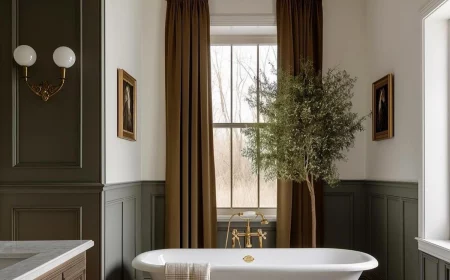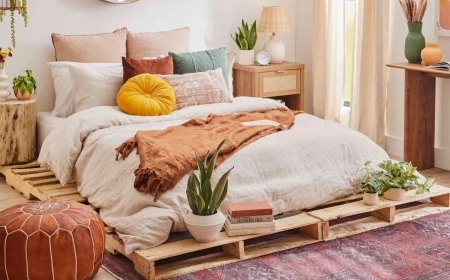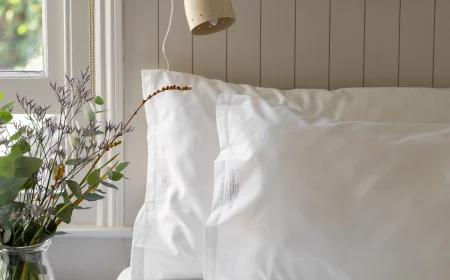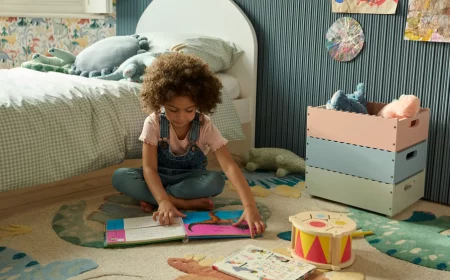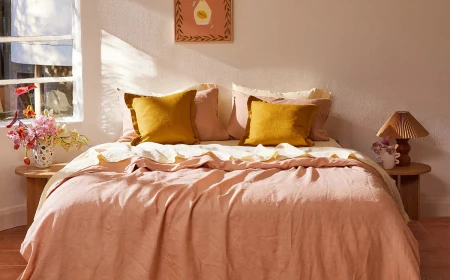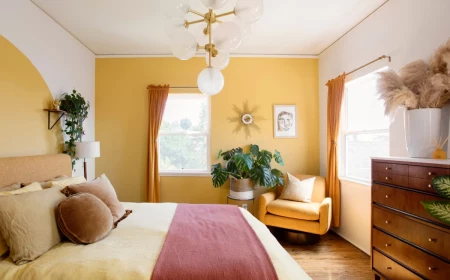A Teen’s Room That Doesn’t Suck: The Parent’s Survival Guide
Few projects stir up more anxiety for parents than redoing a teenager’s bedroom. I once saw a well-meaning parent install a massive, custom sports mural for his son’s birthday. The problem? The son had just traded his love for sports for a new passion: making music. He was mortified. The first thing we discussed was how on earth to cover it up.
In this article
- First Things First: Plan With Your Teen, Not For Them
- The Science of a Smart Layout: Zoning is Everything
- Walls & Floors: Choosing Materials That Actually Last
- Smart Solutions for Furniture and Storage
- Power, Tech, and Lighting: The Modern Essentials
- The Final Layer: Making It Their Own
- Inspirational Gallery
That taught me the most important lesson there is: designing a room for a teenager isn’t about guessing what they want. It’s a negotiation. It’s one of the first real ways you can acknowledge their need for independence and a space that reflects who they are right now, not who they used to be.
So, this guide is built on that idea. We’re going way beyond just picking a paint color. We’ll get into the practical stuff that makes a room actually work—creating zones for sleep, study, and just chilling out. We’ll talk about materials that can handle the chaos of teenage life. And most importantly, we’ll figure out how to work with your teen to build a space that’s a sanctuary for them and a smart move for you. The goal is a room that can grow with them for years to come.

First Things First: Plan With Your Teen, Not For Them
The biggest mistake you can make is trying to surprise them. A surprise party? Awesome. A surprise room makeover? A massive gamble. The very first step is always a conversation, but you have to steer it toward function, not just what they like.
Asking “What color do you want?” usually gets you a one-word answer. But asking “How do you actually use this room?” opens up a real discussion.
The ‘Functional Interview’
Seriously, sit down and ask some practical questions. It shows you respect their needs and helps you design a room that actually serves them. Here’s where I always start:
- What’s the main thing you do in here? Is it just for sleep and homework? Or is it mission control for gaming, band practice, or having friends over?
- Where do you do your homework? If the answer is “on my bed,” it’s a huge red flag that their desk setup is uncomfortable or just not working.
- Let’s talk screen time. A heavy gamer needs a totally different setup than someone who mostly reads. We need to plan for monitors, consoles, and a spaghetti monster of cables.
- Do friends hang out in here? If they do, where do they sit? The floor? The edge of the bed? This tells you whether you need to think about flexible seating.
- What’s the most annoying thing about your room right now? You’ll probably hear a lot about not enough storage, bad lighting, or just nowhere to put stuff.
This whole process builds trust. It flips the script from you telling them what’s going to happen to you helping them solve a problem. A great way to do this visually is to create a shared Pinterest board. It’s a low-pressure way for them to show you styles they like (industrial, minimalist, whatever) without having to find the words.

Let’s Talk Money (Honestly)
Be upfront about the budget. This is another chance to treat them like a young adult. A room makeover can be all over the map, price-wise. A simple refresh with paint and new accessories could run you $250 to $600. But if you’re looking at all-new furniture and flooring, you could be in the $1,500 to $3,500 range, or even more.
Here’s a rule of thumb I always share: splurge on the things their body touches, and save on the things their interests touch.
- Splurge Items: A quality mattress and a truly ergonomic chair. Good sleep and posture are non-negotiable for a growing body. These items will last them well into their college years. For a solid ergonomic chair that will prevent future back pain, expect to invest between $150 and $350. It’s way cheaper than a chiropractor!
- Save Items: Themed decor, posters, and trendy accessories. Their favorite game or band will probably change next year. It’s much smarter to spend $30 on a cool poster than $500 on a wall decal they’ll want to peel off in six months.

The Science of a Smart Layout: Zoning is Everything
Pros don’t just shove furniture into a room; we think in zones. For a teen’s room, you want three clear areas: a sleep zone, a study zone, and a relax zone. Even if you can’t build walls, separating these areas psychologically makes a huge difference. Your brain learns to associate places with activities. If you only study at your desk, you’ll focus better there. It’s that simple.
The Sleep Zone
This zone is sacred. It’s for rest, period. The bed is the anchor. Whenever you can, position the bed so they have a clear view of the door—it’s a primal thing that creates a sense of security. Try to avoid putting the head of the bed directly under a window, which can feel less secure and be drafty.
A full-size (double) bed is usually a great investment, giving them room to grow without eating up the entire floor. For the mattress, think durability. A hybrid mattress, which combines springs for support with foam for comfort, is a fantastic long-term choice that can handle years of use.

The Study Zone
This is where things get technical. Good ergonomics and lighting are key.
- Ergonomics 101: A standard desk is about 29-30 inches high. Honestly, the chair is way more important than the desk. Look for one with adjustable height, armrests, and good lumbar support. Their feet should be flat on the floor with their knees at a 90-degree angle. This isn’t just about comfort; it prevents real strain on their back and neck.
- Let There Be (the Right) Light: The overhead light is not enough. You need dedicated task lighting. A good LED desk lamp is a must. Good to know: light temperature is measured in Kelvin (K). For focus and studying, you want a cool-white light, around 4000K. For relaxing, a warmer 2700K is better. A lamp with adjustable color temperature is a fantastic, flexible option.
The Relax & Social Zone
This is for unwinding and having friends over. It needs to be flexible. Instead of a bulky sofa, think about a comfy armchair, a few big floor cushions, or a modern, sturdy beanbag chair. These can be moved around easily. If they’re a gamer, this zone will probably overlap with their tech setup. Just make sure their gaming chair is comfortable and the monitor is at eye level to prevent neck-ache.

Heads up! A serious note on loft beds: Loft beds are amazing space-savers, but they are not a place to cut corners. I once heard a horror story about a teen who built his own loft bed with guardrails that were too low. He rolled in his sleep and was lucky to only break an arm. Any loft bed must have guardrails that extend at least 5 inches above the mattress surface and must be anchored securely to wall studs, not just drywall. If you’re not 100% confident you can assemble it perfectly, spend the $100-$200 to hire a handyman. It’s worth it.
Walls & Floors: Choosing Materials That Actually Last
Let’s be real: teenagers are hard on a house. The materials you choose need to survive scuffs, spills, and rapidly changing tastes. Spending a little more on the right stuff now will save you from having to repaint or replace things in a couple of years.

Paint: It’s About the Finish, Not Just the Color
Sure, you probably want to stick to a neutral color that can adapt. But the type of paint you buy matters way more. The secret is in the sheen.
Here’s the pro-level rundown. Block out a full weekend if you’re doing this yourself!
- Clean First: Wash the walls with a TSP substitute (you can get it at any hardware store) to get rid of grime and oils.
- Fill & Sand: Fill any nail holes or dings with spackle, let it dry completely, then sand it smooth.
- Prime, Always: Use a quality primer. It’s an extra step, but it’s the difference between a paint job that looks okay and one that looks professional and lasts for years.
- Paint with the Right Sheen: For the walls, use an eggshell or satin finish. They have a slight sheen that makes them durable and easy to wipe clean. Flat or matte paint looks nice, but it scuffs if you just look at it wrong. For the ceiling, a flat finish is perfect because it hides imperfections. For trim and doors, go with semi-gloss—it’s tough as nails.
By the way, always look for low-VOC or no-VOC paint. It has fewer chemical fumes, which is much healthier for a room where someone spends so much time.

Flooring: The Battle of Durability vs. Comfort
So what’s the better choice for the floor, LVP or carpet? Well, it really depends on your priorities.
If your main goal is something that is basically bomb-proof, 100% waterproof, and easy to clean, then Luxury Vinyl Plank (LVP) is your hero. It looks shockingly like real wood or stone these days and is quieter and more comfortable than old-school laminate. It’s a fantastic choice for handling rolling desk chairs and potential spills. Expect it to cost around $3 to $7 per square foot, installed.
On the other hand, if noise is a big concern—maybe your teen is a budding drummer or just likes their music LOUD—then carpet is a fantastic choice. It’s warm, cozy, and great for absorbing sound. The trick is to choose a low-pile nylon carpet in a multi-tonal color or a subtle pattern, which is a master at hiding dirt and stains. Carpet can sometimes be a more budget-friendly option, too.

Smart Solutions for Furniture and Storage
A teenager’s stuff seems to multiply overnight. The furniture you pick should be able to adapt. Think modular systems and vertical space.
Storage That Actually Works
When you hear “I don’t have enough storage,” the answer is almost always to go up. Wall-mounted systems like the Elfa or BOAXEL series are amazing. They use vertical tracks with adjustable shelves, drawers, and even desk components. As their needs change, you just reconfigure the parts—no new holes in the wall.
I’ll be honest, I learned this one the hard way years ago. A client called me in a panic because a floating shelf I’d specified had pulled right out of the drywall. Now, I insist: floating shelves must be anchored directly into wall studs. Use a stud finder. It’s a critical safety issue, especially with heavy books.
And don’t forget the space under the bed! Wheeled containers or beds with built-in drawers are perfect for stashing gear, extra bedding, or clothes.

Quick Win: Tame the Cable Monster
A modern teen room can look like a server farm. The mess of cables from a PC, monitor, and chargers is a total eyesore and a tripping hazard. You can fix this in under 30 minutes for less than $40.
Head to an electronics store or Amazon and grab these three things:
- Cable Raceways: These are simple plastic channels that stick to the wall or the back of a desk to hide all the wires.
- An Under-Desk Tray: It’s just a simple metal basket you screw to the underside of the desk. It gets power strips and bulky adapters off the floor.
- Velcro Ties: Use these instead of plastic zip ties to bundle cables. It makes it so much easier to add or remove something later.
Power, Tech, and Lighting: The Modern Essentials
Great lighting and enough power outlets aren’t optional anymore; they’re the foundation of a functional room. You need to plan for three layers of light:

- Ambient Light: This is the main overhead light. A simple, modern flush-mount fixture usually does the trick.
- Task Light: This is your focused light, like the desk lamp we talked about or a reading light by the bed.
- Accent Light: This is for vibe and personality. LED light strips are hugely popular for a reason. They’re cheap, use very little energy, and can be stuck behind a headboard or monitor to create a cool glow.
Lesser-known trick: When buying light bulbs, look for a high CRI (Color Rendering Index). A CRI of 90+ makes colors look true and natural, so clothes and even skin tones look right. A low CRI can make a room feel dull and washed out.
A Very Serious Warning About Electrical Safety
This is probably the most important advice in this entire guide. A high-end gaming PC, multiple monitors, and speakers can draw a ton of power. Plugging all of that into a single cheap power strip is a legitimate fire hazard. I’ve seen the aftermath of a small fire caused by exactly this. The circuit overloaded, the power strip overheated, and the carpet started to smolder.

If your teen has a serious tech setup, please consult a licensed electrician. For a reasonable cost—maybe $150 to $300—they can check your current circuit or even install a new, dedicated one. It is the single best safety investment you can make in a tech-heavy room.
The Final Layer: Making It Their Own
This is the fun part, where their personality really takes over. The key is to make it all flexible and easy to change.
Instead of letting them use tape or sticky tack that ruins the paint, introduce them to better options:
- Simple Frames: A handful of cheap, modern frames makes posters look like intentional art.
- Magnetic Poster Hangers: These are cool wooden strips that clamp onto a print. Swapping art takes seconds.
- Pinboards: A big cork board is a classic, but you can also get awesome acoustic felt panels. They come in cool geometric shapes, help absorb sound (a huge plus!), and work perfectly for pinning up photos and schedules.
By focusing on these foundations—collaboration, smart zoning, durable materials, and safety—you can create a room that does more than just look cool. You build a space that supports their work, respects their hobbies, and is built to last.

Your mission this week: Use the ‘Functional Interview’ questions and have a real talk with your teen about their room. I’d love to hear what surprised you the most!
Inspirational Gallery


The one-piece-of-furniture-that-does-it-all: Look for a loft bed with an integrated desk underneath, like the STUVA / FRITIDS model from IKEA. It instantly frees up floor space, creating a distinct zone for sleep and another for study, which is crucial for focus in a small room.

- Create a ‘chill zone’ with a simple, oversized floor cushion or a structured bean bag chair from a brand like Lovesac.
- Anchor the space with a small, durable rug that can handle spills.
- Add a dedicated floor lamp with a warm bulb to make it feel like an intentional, cozy retreat for reading or listening to music.


A study by the Journal of Environmental Psychology found that personalized spaces can significantly boost a person’s sense of identity and well-being.
For a teen, this isn’t just decoration; it’s about building a nest. Allowing them to hang posters, display collectibles, or choose their own bedding is a powerful way to support their emotional development and give them ownership over their environment.

How to handle the inevitable tech clutter?
Acknowledge the cable chaos head-on. Invest in a power strip with USB ports that can be mounted to the underside of the desk. Use fabric cable sleeves or adhesive cable clips to bundle and hide wires running from consoles, monitors, and chargers. A simple pegboard from Wall Control can also be a game-changer for hanging headphones and controllers neatly.

Instead of permanent, themed wallpaper, consider removable wall decals from sites like Etsy or WallsNeedLove. They offer a huge impact with zero commitment. When their passion for skateboarding gives way to astronomy, you can simply peel them off without damaging the paint underneath. It’s the ultimate solution for evolving tastes.


Paint Durability: A matte or flat finish looks modern but scuffs if you so much as look at it wrong. Opt for an eggshell or satin finish, especially from a durable line like Sherwin-Williams’ Emerald or Benjamin Moore’s Scuff-X. They offer a slight sheen that makes wiping away marks and mysterious smudges infinitely easier.

- It provides flexible, non-permanent decoration.
- It doubles as ambient, customizable lighting.
- It helps define zones, like highlighting a desk area or bed frame.
The secret? LED strip lights. A kit from Govee or Philips Hue allows your teen to control the color and brightness from their phone, offering a high-tech feel that they can change with their mood.

A single coat of a dark, moody color like charcoal gray or navy blue on one wall can make a room feel larger and more sophisticated.


The 3-Layer Lighting Rule: Every functional room needs three types of light. Start with general overhead lighting (Ambient), add a focused task light for the desk (Task), and finish with something that adds character, like a neon sign or string lights (Accent). This combination makes the room versatile for study, relaxation, and socializing.

Think beyond the traditional bookshelf. Industrial-style pipe shelving or a set of floating ledges can display everything from books and trophies to sneakers and collectibles. This turns their personal items into a unique, rotating art installation.

Can you really put plants in a teen’s room?
Absolutely, but choose wisely. Opt for nearly indestructible plants that thrive on neglect. A Snake Plant or a ZZ Plant can tolerate low light and infrequent watering. It adds a touch of green and responsibility without becoming a chore.


Before buying new, look at your existing furniture. Could that old dresser be transformed with a coat of chalk paint and some new hardware? Could a boring headboard be reupholstered with a cool, graphic fabric? A weekend DIY project can save money and result in a truly one-of-a-kind piece.

Fact: The human brain doesn’t fully develop its organizational capacity until the mid-20s.
This means a teen isn’t messy on purpose; they’re wired for it. Make organization effortless. Use open-front bins, clear storage boxes, and hooks everywhere. If they can see where things go and toss them in easily, they’re more likely to use the system.


Open Wardrobe: A clothing rack, common in minimalist and industrial design, forces neatness because everything is on display. It’s a great solution for a teen who loves fashion and wants to showcase their favorite pieces.
Closed Wardrobe: A classic armoire or closet system like IKEA’s PAX lets them hide the chaos. If your teen’s mantra is ‘out of sight, out of mind,’ this is the more peaceful option for everyone.

For the aspiring musician, acoustic foam panels aren’t just for soundproofing—they’re a design statement. Arranged in a geometric pattern, they add texture and color to a wall while slightly dampening the sound from their guitar amp or speakers, a subtle benefit your ears will appreciate.

- A magnetic primer (like Rust-Oleum’s) turns any wall into a giant magnet board.
- A chalkboard or whiteboard paint creates a massive canvas for doodles, formulas, or messages from friends.
The result? An interactive feature wall that’s both functional and fun, reducing the temptation to write on non-designated surfaces.


A common mistake: Choosing a desk that’s too small or flimsy. A teen’s desk needs to support a laptop, monitor, textbooks, and the weight of them leaning on it in frustration. Look for a sturdy work surface at least 40 inches wide and 20 inches deep to provide enough functional space.

Introduce texture to avoid a flat, boring look. A chunky knit throw, a faux-fur rug, a velvet cushion, or a weathered wood headboard can add warmth and sensory depth, making the room feel more inviting and complete.

Worried about them putting holes in the wall?
Use high-quality removable hanging strips like 3M Command Strips. They now make versions that can hold significant weight, perfect for framed posters, small shelves, and even string lights. Teach your teen how to use them properly (clean the wall first!) to grant them decorating freedom without long-term damage.


According to a Nielsen report, teens spend an average of 45 hours a week on screens.
This makes the chair the most important piece of furniture after the bed. Don’t skimp. A proper ergonomic chair that supports their back during long gaming or study sessions is a health investment, not just a design choice. Look for adjustable arms and lumbar support.

For a durable and teen-proof floor, consider Luxury Vinyl Plank (LVP). It mimics the look of hardwood but is waterproof, scratch-resistant, and much more forgiving when something gets spilled or dropped. It’s a smart long-term choice that will outlast the teenage years.

A simple cork board or a grid of metal wires (like the IKEA MYRHEDEN) provides a dedicated, damage-free zone for photos, ticket stubs, and mementos. It contains the clutter while allowing them to easily curate a visual diary of their life.


- Get a bed with built-in drawers underneath for clothes or extra bedding.
- Find an ottoman with hidden storage for gaming controllers or magazines.
- Use a headboard with integrated shelving as a replacement for a nightstand.
Every piece of furniture can serve at least two purposes if you choose wisely.

Splurge vs. Save: Invest your money in the items that get the most use and abuse: a quality mattress, a sturdy desk, and a good chair. Save on decorative items like pillows, posters, and lamps, which can be easily and inexpensively swapped out as their tastes change.
Don’t forget the ceiling!
It’s often called the ‘fifth wall’ by designers. Painting it a dark color can create a cozy, den-like atmosphere. Alternatively, applying glow-in-the-dark star decals or even a map-themed wallpaper can add an unexpected and immersive layer to the room’s design.

